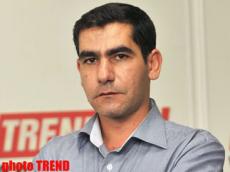|
|
TODAY.AZ / World news
Iran, P5+1 back to the drawing board
29 May 2012 [12:56] - TODAY.AZ
 After four rounds of negotiations between Iran and P5+1 in Turkey and Baghdad since April, the hopes of resolving concerns over Iran's disputed nuclear programme seems be paled as Iran rejected both allowing the International Atomic Energy Agency's inspectors to visit the alleged nuclear blast chamber at Parchin military complex and halting 20 per cent uranium enrichment.
After four rounds of negotiations between Iran and P5+1 in Turkey and Baghdad since April, the hopes of resolving concerns over Iran's disputed nuclear programme seems be paled as Iran rejected both allowing the International Atomic Energy Agency's inspectors to visit the alleged nuclear blast chamber at Parchin military complex and halting 20 per cent uranium enrichment.The sides are preparing to launch a new round of talks in mod-June in Russia.
What's been going? Maybe the wrong addresses published by outlets such as the U.S. readiness to recognise Iran's uranium enrichment rights for a 3.5 per cent level, or IAEA chief Yukia Amano's visit to Tehran that be taken as an Iranian government's compromise against the West to clarify its nuclear activities.
The sanctions imposed by UNSC, EU and the U.S. are law and eliminating them while Iran puts the first precondition halting the sanctions, is impossible in the short term. Eliminating sanctions over Iraq lasted seven years after collapsing Saddam Hussein's regime. The sanctions as I said are law and the Iranian government knows full well that they cannot be halted. Even the West accepts that, so why does Iran propose downing the sanctions? Maybe it's because in these sorts of matters, anybody first offers his ceiling proposal.
According to the sanctions, Iran is not permitted to enrich uranium, so the recognising of Iran's uranium enrichment rights even by a 3.5 per cent level in the frame of the Non-Proliferation Treaty is impossible in the short term as well.
On the other hand, the West waits, expecting Iran will give up and accept halting its uranium enrichment programme under the weighty pressure of sanctions, but some authorities such as the Iranian Revolutionary Guard Corps (IRGC) actually thank sanctions because of being able to get billions worth contracts in absence of foreign companies.
The Iranian IRGC has signed over $25 billion worth oil contracts and during the last two months it could get $4 billion worth in two construction projects, desalination of Caspian Sea water and transferring it to central regions and construction of the world's biggest cement dam in Bakhtyari province.
The problem is more complicated than it seems apparently, especially regarding the forces' benefits inside Iran thanks to sanctions and also Iran's only real opponent in the U.S. which is preparing presidential elections in November and any compromise against Iran could damage Barak Obama's image and position.
Iran could produce 6.2 tons of 3.5 per cent enriched uranium and 140 kg of 20 per cent of an enriched one, which is enough to build at least five nuclear bombs as ISIS reported last week. The west regards this amount of uranium as a threat, but Iran considers it as major pressure tool against the West, the same object with two different point views.
The serious talks may start in 2013 after establishing the new government in the U.S. when the time might be ready to compromise against Iran and in turn Iran can probe the effectiveness of new rounds of talks with the U.S. and the European Union with the unilateral sanctions over Iran's Central Bank and oil sales which will be take force in late June.
Dalga Khatinoglu / Trend/
URL: http://www.today.az/news/regions/107858.html
 Print version
Print version
Views: 4322
Connect with us. Get latest news and updates.
See Also
- 13 October 2025 [09:00]
US will send Ukraine Tomahawks if war unresolved - 13 October 2025 [08:00]
Biden receiving radiation therapy for prostate cancer - 11 October 2025 [22:55]
China launches three satellites from offshore platform using Gravity-1 rocket - 11 October 2025 [22:25]
Denmark allocates 2.1 bn kroner to counter unidentified drones - 11 October 2025 [20:45]
Terrorist attack on police station in Peshawar repelled, two killed - 11 October 2025 [18:35]
US administration dismisses dozens of CDC staff in latest cuts - 11 October 2025 [18:05]
North Korea showcases intercontinental ballistic missile at military parade - 11 October 2025 [09:00]
Named world's best skyscraper of 2025 - 11 October 2025 [08:00]
Toyota recalls thousands of US vehicles over seat issue - 10 October 2025 [21:50]
UK regulator designates Google as key market player
Most Popular
 Azerbaijan and Kazakhstan discuss support mechanisms for entrepreneurs
Azerbaijan and Kazakhstan discuss support mechanisms for entrepreneurs
 USCIRF Commissioner meets Azerbaijani Diaspora representatives in Kyiv
USCIRF Commissioner meets Azerbaijani Diaspora representatives in Kyiv
 China tightens checks on Nvidia AI chips
China tightens checks on Nvidia AI chips
 UK regulator designates Google as key market player
UK regulator designates Google as key market player
 Azerbaijan highlights Middle Corridor as sustainable alternative to northern trade routes
Azerbaijan highlights Middle Corridor as sustainable alternative to northern trade routes
 TIME includes Hyundai’s Xcient among top inventions of 2025
TIME includes Hyundai’s Xcient among top inventions of 2025
 Azerbaijan to host first-ever International Watercolor Festival
Azerbaijan to host first-ever International Watercolor Festival
